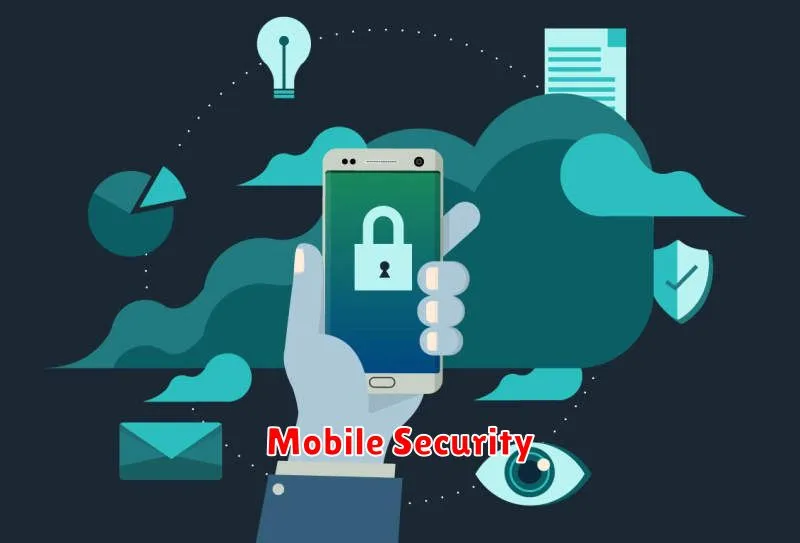In today’s digital world, our smartphones have become indispensable extensions of ourselves, holding a vast treasure trove of personal information, from banking details to confidential conversations. But as our reliance on mobile devices grows, so does the threat of cyberattacks. The evolution of mobile security is a constant arms race, with attackers finding new ways to exploit vulnerabilities, while developers strive to create more robust defenses. Mobile security is not just about protecting your phone from theft, but also about safeguarding the sensitive data that resides within it from unauthorized access and malicious activities.
From the early days of simple passcodes to the sophisticated biometric authentication and advanced encryption techniques of today, mobile security has come a long way. However, the threat landscape is ever-evolving, with new vulnerabilities emerging constantly. This article delves into the evolution of mobile security, exploring the challenges we face and the latest advancements that are shaping the future of protecting your data on the go. We’ll examine how secure your data truly is and what steps you can take to ensure your mobile experience remains safe and private.
The Importance of Mobile Security in 2024
In 2024, mobile security is more crucial than ever. Our lives are increasingly intertwined with our smartphones, storing sensitive data like bank details, personal information, and even health records. With the rise of sophisticated cyber threats, protecting this data is paramount.
One major concern is the proliferation of malware designed to steal data or disrupt device functionality. Phishing scams also pose a significant risk, tricking users into divulging sensitive information. These threats are becoming increasingly sophisticated, making robust mobile security solutions essential.
Beyond individual threats, businesses face significant challenges in securing mobile devices. Data breaches can lead to financial losses, reputational damage, and legal consequences. Ensuring the security of company data accessed through employee smartphones is critical for maintaining trust and productivity.
Mobile security isn’t just about protecting against threats; it’s also about safeguarding user privacy. With location tracking, microphone access, and camera usage increasingly common in apps, users need to be aware of how their data is being used and take steps to protect it.
As we move into 2024, investing in strong mobile security measures is no longer an option but a necessity. From utilizing strong passwords and multi-factor authentication to choosing reputable apps and regularly updating software, individuals and businesses alike must prioritize mobile security to protect themselves from the evolving landscape of cyber threats.
How to Protect Your Data on Mobile Devices

With the increasing reliance on mobile devices for everything from banking to shopping, the need for strong mobile security has never been greater. Protecting your data on your mobile devices is crucial to ensuring your privacy and financial security.
Here are some essential tips for safeguarding your data:
- Use a strong password and enable two-factor authentication: This extra layer of security makes it much harder for unauthorized users to access your device.
- Keep your operating system and apps up to date: Software updates often include security patches that can fix vulnerabilities.
- Be cautious about clicking on suspicious links or downloading apps from unknown sources: These could be phishing scams or contain malware.
- Install a reputable mobile security app: This can provide real-time protection against threats and help you locate your device if it’s lost or stolen.
- Enable device encryption: This scrambles your data, making it difficult for hackers to access it.
- Be mindful of what you share online: Avoid posting personal information like your home address or financial details on social media.
- Use a VPN: A virtual private network encrypts your internet traffic, protecting your data from prying eyes.
- Be cautious about public Wi-Fi networks: These networks are often unsecured, making your data vulnerable.
- Regularly back up your data: This allows you to restore your data if your device is lost, stolen, or damaged.
By following these tips, you can significantly reduce the risk of your data being compromised on your mobile devices.
The Role of Encryption in Mobile Security
In the modern age of digital connectivity, mobile devices have become indispensable extensions of our lives, holding sensitive information such as personal data, financial records, and even business secrets. As reliance on mobile technology grows, so does the threat of data breaches and cyberattacks. To mitigate these risks, encryption plays a crucial role in safeguarding mobile device security.
Encryption acts as a digital lock, transforming data into an unreadable format, rendering it incomprehensible to unauthorized individuals. When data is encrypted, it is scrambled using a complex algorithm, requiring a unique key to decrypt and access the original information. This ensures that even if a device is lost or stolen, the data remains protected.
Mobile devices employ various encryption methods, including hardware-level encryption, where the device’s hardware itself encrypts data, and software-level encryption, implemented through apps and operating systems. End-to-end encryption is another prominent technique, securing communication from sender to recipient, preventing interception and unauthorized access.
By employing encryption, mobile devices enhance security in several key areas:
- Data Protection: Encryption safeguards sensitive data, including personal information, financial details, and confidential business documents, from unauthorized access.
- Secure Communication: Encryption ensures that communication between mobile devices and servers is protected, preventing eavesdropping and data interception.
- Protection Against Malware: Encryption makes it more difficult for malware to access and steal sensitive data, as it requires decrypting the data before it can be used.
In conclusion, encryption is an essential cornerstone of mobile device security. It provides a robust shield against data breaches, unauthorized access, and malicious threats, safeguarding our valuable information in the ever-evolving digital landscape. By adopting robust encryption practices, we can enhance the security of our mobile devices and protect our sensitive data from falling into the wrong hands.
Mobile Security Apps You Should Know About
In the digital age, mobile devices have become indispensable extensions of ourselves. They hold our personal data, financial information, and sensitive communications, making it crucial to prioritize their security. While built-in security features offer a baseline of protection, specialized mobile security apps provide an extra layer of defense against potential threats. Here are some highly-rated and essential mobile security apps you should know about:
Antivirus and Malware Protection
These apps act as vigilant guardians, scanning your device for malicious software, known as malware, and removing any threats they detect. They also offer real-time protection against phishing attacks and other online dangers. Some popular options include:
- Avast Mobile Security: A comprehensive security solution that includes antivirus, anti-theft, and privacy protection features.
- Bitdefender Mobile Security: Renowned for its powerful antivirus engine and its ability to detect and block even the most sophisticated malware.
- Kaspersky Mobile Antivirus: Offers strong protection against malware, phishing attempts, and suspicious websites.
Privacy and Data Protection
These apps focus on safeguarding your privacy and controlling your data. They can help you manage permissions for apps, block unwanted trackers, and encrypt sensitive information. Consider these options:
- ProtonVPN: Provides secure and encrypted VPN services, masking your IP address and protecting your online activity.
- DuckDuckGo Privacy Browser: Offers enhanced privacy features, blocking trackers and protecting your browsing history.
- Signal: A secure messaging app that uses end-to-end encryption, ensuring that your conversations remain private.
Anti-theft and Device Management
These apps enable you to locate and secure your device in case of loss or theft. They also offer features like remote data wiping and device locking. Some of the best in this category include:
- Find My iPhone (iOS): Apple’s built-in anti-theft solution, allowing you to locate, lock, or wipe your device remotely.
- Find My Device (Android): Google’s device management app, offering similar functionalities to Find My iPhone.
- Cerberus Anti-theft: A comprehensive anti-theft app with advanced features like GPS tracking, remote control, and photo capturing.
Investing in mobile security apps is a proactive step towards protecting your valuable data and ensuring peace of mind in the digital world. Remember to choose reputable apps with strong security features and regularly update them to maintain optimal protection.
Common Mobile Security Threats and How to Avoid Them
Mobile devices have become an indispensable part of our lives, storing sensitive information like financial data, personal contacts, and even health records. While the convenience of these devices is undeniable, their growing reliance also brings a heightened risk of security threats. It’s essential to understand the common threats and implement appropriate safeguards to protect your data.
Malware is a significant threat that can infiltrate your device through malicious apps, websites, or even SMS messages. Once installed, it can steal personal information, track your online activity, or even take control of your device. Phishing is another common tactic used by cybercriminals. They send fraudulent messages, often disguised as legitimate communication from banks or other trusted entities, to trick you into revealing sensitive information like login credentials or credit card details.
Public Wi-Fi networks can be insecure, leaving your device vulnerable to eavesdropping and data theft. Always use a VPN (Virtual Private Network) when connecting to public Wi-Fi to encrypt your traffic and protect your data. Weak passwords are a major security risk. Create strong, unique passwords for all your accounts, and avoid using the same password across multiple platforms. Enable two-factor authentication whenever possible for an extra layer of security.
Unnecessary apps can be a vector for malware or data leaks. Only download apps from trusted sources like the official app stores, and regularly review your installed apps, removing any that are suspicious or no longer needed. Keep your device operating system and apps up-to-date with the latest security patches. Be cautious about the permissions you grant to apps, especially those that request access to sensitive data.
By understanding these common threats and implementing the recommended safeguards, you can significantly reduce your risk of falling victim to mobile security breaches. Stay informed, practice safe browsing habits, and be vigilant about your device’s security to protect your valuable data.
Future Trends in Mobile Security

Mobile security is a constantly evolving field, with new threats emerging all the time. As technology advances, so do the methods used to compromise mobile devices. To stay ahead of the curve, it’s crucial to understand the emerging trends in mobile security.
Here are some key future trends in mobile security:
Biometric Authentication
Biometric authentication, such as fingerprint scanning and facial recognition, is becoming increasingly popular for mobile devices. These methods offer a more secure and convenient way to authenticate users than traditional passwords. As these technologies improve, they are likely to become even more prevalent in mobile security.
Zero Trust Security
The zero-trust security model assumes that no user or device can be trusted by default. This approach involves verifying every user and device before granting access to sensitive data. As mobile devices become increasingly integrated into enterprise networks, zero-trust security will be essential to protect sensitive data.
Artificial Intelligence (AI) and Machine Learning (ML)
AI and ML are being used to develop more sophisticated mobile security solutions. These technologies can analyze large datasets to identify patterns and anomalies that indicate malicious activity. They can also be used to create more effective fraud detection systems.
Blockchain Technology
Blockchain technology is being explored as a potential solution for enhancing mobile security. It offers a secure and transparent way to store and manage sensitive data. Blockchain can also be used to create secure mobile payment systems.
Homomorphic Encryption
Homomorphic encryption allows data to be processed while it is still encrypted. This technology can be used to protect mobile data from unauthorized access, even if the device is compromised. As homomorphic encryption matures, it has the potential to revolutionize mobile security.
Mobile security is an ongoing challenge. As technology continues to evolve, it is crucial to stay informed about the latest trends and threats. By adopting these future trends, we can ensure the security of our mobile devices and the data they contain.

